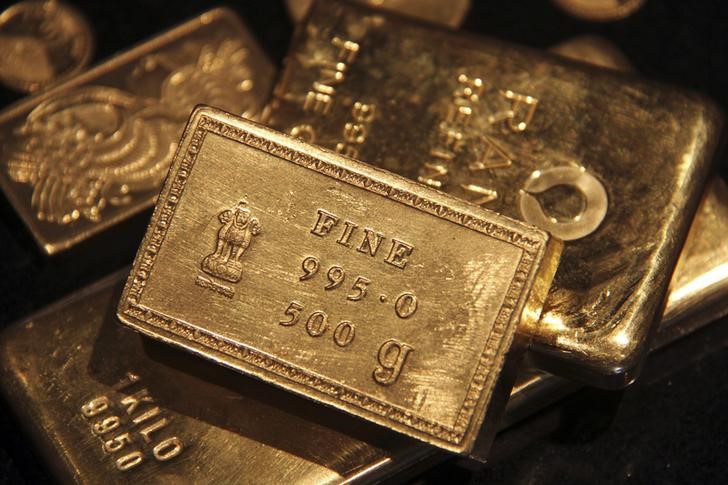By Barani Krishnan
Investing.com -- The regulators have acted and the Biden administration has assured there won't be another banking debacle in the U.S. to trigger a financial crisis relapse. But skittish investors looking for safe-havens still plowed into gold anyway on Monday, sending the yellow metal's prices to six-month highs.
The front-month April gold futures contract on New York's Comex was at $1,910.40 an ounce, up $43.20, or 2.3% by 12:30 ET (16:30 GMT). The session high was $1,918.20, a peak since the $1,959.10 registered on Feb. 2. The rally came on the back of last week's collapse of Silicon Valley Bank, or SVB, one of the top 20 lenders in the United States.
The spot price of gold, more closely followed than futures by some traders, was at $1,905.38, up $38.14, or 2.04% on the day. The session high for spot gold was $1,913.13.
"Trader and investor anxiety is elevated to start the trading week, following a turbulent weekend in the wake of late last week's collapse of Silicon Valley Bank," analyst and author Jim Wyckoff said on the website of precious metals dealer Kitco.
Spot gold could see some correction before climbing further in the near term, possibly to $1,928, ahead of Tuesday's key Consumer Price Index, or inflation, reading which will likely decide whether the Federal Reserve goes with a 25-basis-point, or 50 bps, hike at its March 22 rate decision.
The CPI is expected to have expanded 6% year-on-year in February from 6.4% in January and 0.4% for the month versus a previous 0.5%. Core CPI, a reading that strips out volatile food and energy prices, is forecast to have risen 5.5% for the year to February from the previous annual reading of 5.6%. Month-on-month, the core number is expected to be flat at 0.4%.
"The SVB crisis has brought charm back to gold but, pending the CPI release, a correction might be on the deck," said Sunil Kumar Dixit, chief technical strategist at SKCharting.com.
Dixit said spot gold's RSI, or Relative Strength Index, on a four-hour timeframe, becomes overbought at 81, calling for some pullback toward the support areas of $1,868, below, which could trigger further correction toward $1,955 and $1,842.
"After retesting the breakout zone of $1,868 or bit lower, resumption of the uptrend may reach $1,928, followed by major resistance at $,1968."
The government will ensure the bank deposits of Americans remain safe and the country does not experience another financial crisis, Biden told reporters at the White House.
"No losses of a dime … No losses will be borne by the taxpayers," the president said. "The money will come from the fees that banks pay into the Federal Deposit Insurance [Corporation, or FDIC]. Because of the actions taken by regulators, every American should feel confident, their deposits will be there if and when they need them."
Biden also said he was going to request Congress to review and strengthen post-financial crisis banking laws that were loosened by the previous administration, "to make sure that the crisis we saw in 2008 would not happen again."
The latest U.S. banking crisis unfolded after investors at California-based Silicon Valley Bank yanked $42 billion in deposits from Silicon Valley Bank, or SVB, which according to the FDIC, is one of the top 20 American commercial banks. SVB is the largest US lender to fail since Washington Mutual collapsed in 2008 at the height of the financial crisis then.
SVB provided financing for almost half of US venture-backed technology and healthcare companies. At the end of 2022, the bank said it had $151.5B in uninsured deposits, $137.6B of which was held by US depositors. Its total assets as of the end of last year were $209B.
The FDIC also took control of Signature, which had $110.36B in assets and $88.59B in deposits at the end of last year, according to New York state's Department of Financial Services.
Biden said the FDIC protection for depositors at SVB and Signature will not be extended to investors and the management at the collapsed banks, which he accused of excessive risk-taking.
"The management of these banks will be fired," Biden said. "If the bank is taken over by FDIC, the people running the bank should not work there anymore. Investors in the banks will not be protected. They knowingly took a risk and when the risk didn't pay off, investors lose their money. That's how capitalism works and so forth. But there are very important questions of how these banks got into the circumstances. In the first place, we must get the full accounting of what happened and why those responsible can be held accountable."
Since the crisis broke, both regulators and the banking industry were working to contain it, reports said.
The bank, viewed as the next to fall – First Republic – secured additional financing from JPMorgan Chase & Co (NYSE:JPM) at the weekend, resulting in $70B in unused liquidity, firepower it could use to respond to potential customer withdrawals.
